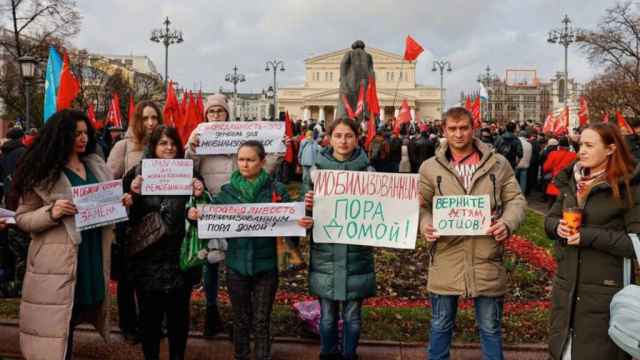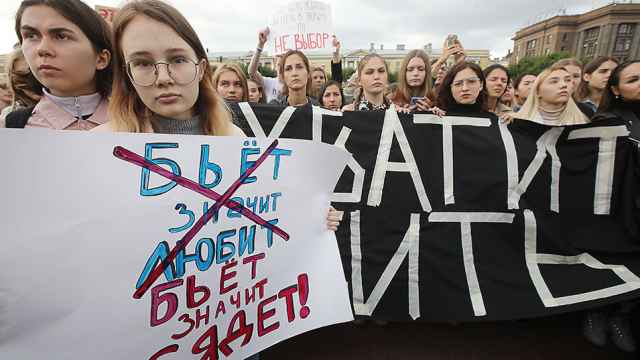Russia’s invasion of Ukraine in February plunged many liberal-minded Russians into a state of shock and apathy. But for Anna Rivina, the country’s leading expert on domestic and gender-based violence, the path forward amid wartime chaos was clear.
“When the entire world seems to be falling apart, it is difficult to decide what to do, so I decided that it would be right to do what I know best and help to tackle the problem of gender-based violence,” Rivina told The Moscow Times.
Rivina is well-known in Russia and abroad as the founder of the country’s most prominent anti-domestic violence group Nasiliu.net (No to Violence), which helps survivors of abuse and brings attention to an issue still largely taboo in Russian society.
Her new project, Labirint (Russian for “maze”), looks to help women who were forced to flee the war, political repressions, or who simply left home in search of better economic opportunities — and now find themselves under threat.
Instances of gender-based violence are known to increase in times of war and conflict.
The UN said in June it had received 124 reports of conflict-related sexual violence committed across Ukraine, though the growing evidence of alleged Russian war crimes suggests the real number of cases is likely to be far higher.

Labirint is prepared to assist all victims of war violence, including women who were raped by Russian soldiers and fled to neighboring countries in search of help, according to Rivina.
The NGO also looks to help women who have been targeted by human traffickers, forced into sexual exploitation or who are simply unable to react to an instance of domestic abuse amid a state of economic dependency and insecurity.
“We thought it made sense to give them [the women] all the cards, as it were, so that they could ask for help if they needed it,” said Rivina.
“We are talking not just about [the issue of] domestic abuse but also rape, stalking, and violence against children.”
In just a few months, Labirint formed a network of more than 100 female volunteers and trained psychologists who are prepared to work with female refugees and other women who relocated from their home countries.
“I closely follow what big humanitarian organizations are doing, so the news of Labirint's creation reached me online almost instantly,” a 30-year-old Labirint volunteer told The Moscow Times.
Like most other people involved in the initiative, the Russian volunteer, who requested anonymity to speak freely, is currently living abroad — an experience she said makes the project’s mission a personal one for her.
“I got lucky and haven’t faced instances of violence, but I understand very well that immigration makes women more vulnerable,” she said.
“This is particularly true for the refugees: when [one] doesn’t have income and often doesn’t know the [local] language, all [they] can hope for is other people’s kindness. Unfortunately, there are instances when women’s trust could be exploited.”
Located in different countries, Labirint’s volunteers usually speak multiple languages, including Russian and that of the country where they are based. The NGO’s website is available in Russian, Ukrainian, English and Belarusian.
Rivina said making “women from Belarus visible” was especially important for Labirint.
Tens of thousands of women fled Belarus from growing political repression following a wave of anti-government unrest in 2020 and Belarus’ support for Russia’s attack on Ukraine.
Independent Belarusian organizations that worked on issues of women‘s rights and gender-based violence were “destroyed” by the government, Rivina said, leaving Belarusian women in vulnerable situations with no one to turn to.
Rivina hopes Labirint can become the sought-after helping hand for Belarusians and other women from the former Soviet space and beyond.
“Our geography is widespread. We have had people from Ukraine reach out, people from Kazakhstan, those who moved to the Americas, including South America,” said Rivina.
“We have had dozens of requests so far, but not many people know about us yet…Our resources right now outnumber the demand.”
To raise awareness about its services and the resources it can offer to female refugees and immigrants, Labirint has been working with other groups helping those affected by the war, including the Helping to Leave Foundation, which assists Ukrainians in leaving the conflict zone and — in cases of forced deportation — escaping from Russia.
Rivina says she and her team have ambitious plans for the future.
“We do want to have the opportunity to say that in every country where a woman could possibly find herself we have a female volunteer who speaks the local language, knows how to work in such cases, and is able to hold a woman’s hand through that journey.”
A Message from The Moscow Times:
Dear readers,
We are facing unprecedented challenges. Russia's Prosecutor General's Office has designated The Moscow Times as an "undesirable" organization, criminalizing our work and putting our staff at risk of prosecution. This follows our earlier unjust labeling as a "foreign agent."
These actions are direct attempts to silence independent journalism in Russia. The authorities claim our work "discredits the decisions of the Russian leadership." We see things differently: we strive to provide accurate, unbiased reporting on Russia.
We, the journalists of The Moscow Times, refuse to be silenced. But to continue our work, we need your help.
Your support, no matter how small, makes a world of difference. If you can, please support us monthly starting from just $2. It's quick to set up, and every contribution makes a significant impact.
By supporting The Moscow Times, you're defending open, independent journalism in the face of repression. Thank you for standing with us.
Remind me later.







